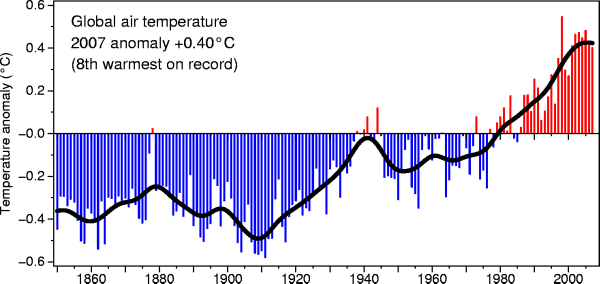
Graph courtesy of the UK’s Climate Research Unit
The graph above, taken from the UK’s Climate Research Unit, is very sobering. I first noticed the graph when Joseph Romm did an excellent analysis of it on his Climate Progress site.
A few points to note from Joe’s piece:
- * the 2000s are on track to be nearly 0.2°C warmer than the 1990s
- * since the 1990s were only 0.14°C warmer than the 1980s => global warming is accelerating
- * 2008, though cooler than most of the 2000s is on track to be almost 0.1°C warmer than the decade of the 1990s as a whole
- * The 2000s will easily be the hottest decade in recorded history
- * The “coming decade” (2010-20) is poised to be the warmest on record, globally
- * The coming decade is poised to see faster temperature rise than any decade since the authors’ calculations began in 1960
- * The fast warming would likely begin early in the next decade — similar to the 2007 prediction by the Hadley Center in Science (see “Climate Forecast: Hot — and then Very Hot“)
In case anyone had any doubts that global warming is occurring, this should set those doubts to rest.
Governments are acting too slowly on this. It is up to individuals and companies to take actions to reduce our impact on the planet.
The companies we cover on this blog: IBM, Microsoft, HP, Siemens, Fujitsu Siemens Computers, Dell, SAP, Oracle, Nortel, Cisco, etc. are all making significant efforts to reduce their impacts on the planet (or we wouldn’t be covering them!).
However, as the graph above indicates, our way of life is under threat. Now, as George Monbiot says,
We need to resurrect the old-fashioned virtues of uniting in the face of a crisis, of resourcefulness and community action
We all need to band together not only at national levels, but at company and community levels to do everything we can to work to reduce our impact on the planet. Don’t rely on your politicians to do it for you. Get together with friends, neighbours, co-workers and make a change. Today.

